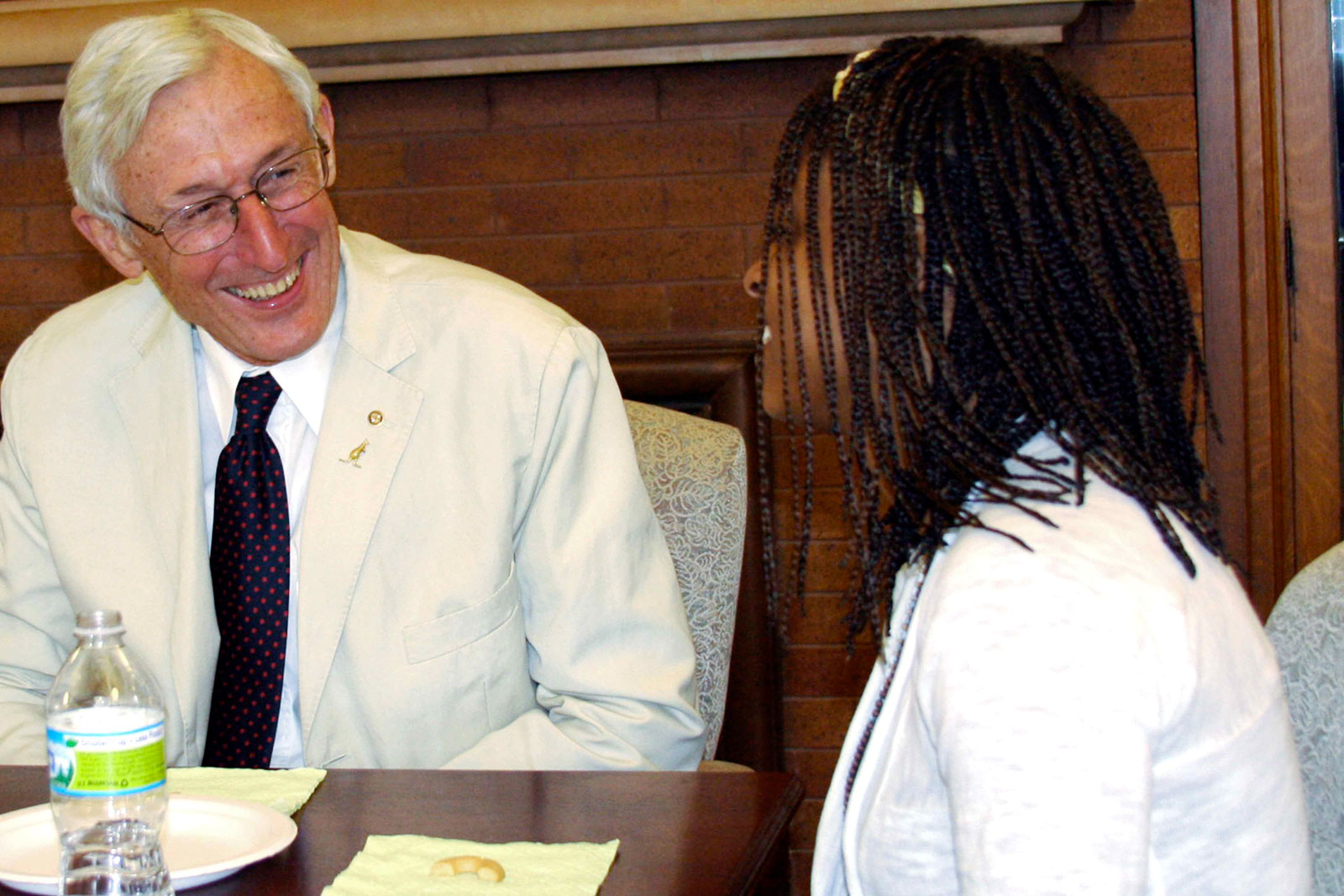
Bringing The Nutrition Of Milk To Millions
To combat malnutrition, the president of Zambia promised one pint of milk per day to each school-age child in the country. He soon found his promise impossible to keep. Thankfully, Alex Buchanan was able to help.
It was the early 1970s, and Buchanan (‘60 MS dairy bacteriology and agricultural economics) had recently developed nutritionally fortified biscuits that would help the president keep his promise.
Promoted with the slogan “eat more milk,” an intense publicity campaign encouraged people to feed the nutritious biscuits to their young children. The president wore the ring-shaped cookies on a string around his neck, and Buchanan was photographed feeding them to his own daughter.
The nutritional biscuits Buchanan developed more than 35 years ago still are used today in developing countries and for disaster relief.
Buchanan recently sat down with a group of global resource systems students at Iowa State. He shared lessons learned during his life’s work bringing the nutritional benefits of milk to those without access due to location or circumstance.
As he looked across the table Buchanan saw a little of himself in the burgeoning scientists, many bent on finding ways to improve food systems in developing countries. The secret to his success, he shared, was getting to know the locals and customizing each product to the region’s tastes, culture and nutritional needs.
“When I started my research they had tried to offer milk powder to developing countries. It turns out locals weren’t used to the flavor, they didn’t have refrigeration once it was mixed — assuming they had safe water to mix it with, and many were lactose intolerant,” he says.
With the support of the Australian Dairy Board, he and his research team at the Commonwealth Scientific and Industrial Research Organization dairy research laboratory in Melbourne chose a new focus. They created a fortified biscuit with all the nutritional value of milk, and it improved children’s health immediately.
“I heard over and over again that once the kids started eating the biscuits they would stay awake all morning in primary school,” he says. “Kids put on a tremendous amount of weight – a couple of kilos in a few weeks. And the most heartening result was vitamin A deficiencies disappeared quickly.”
In a feeding trial with Ethiopian AIDS orphans in 2005, Buchanan says researchers noticed a similar dramatic improvement in weight and body mass index.
The high-protein Australian milk biscuit and a second high-energy biscuit they also developed still are staples of his country’s international food aid program, Buchanan says. Six biscuits are nutritionally equal to one pint of milk. Each biscuit is 20 percent fat, 20 percent protein and 55 percent carbohydrate with the remaining percent in moisture, vitamins and minerals.
Buchanan also developed an affordable infant food made from rice and soy flour as part of his work at Kasetsart University in Bangkok, Thailand.
“Post-weaning infants were experiencing serious brain damage due to malnutrition, a problem that affects more than half the world’s children. We produced a weaning food that suited them. It was equivalent to milk, but it was distributed widely and the kids liked it,” he says. “That was 35 years ago and they’re still producing it in Bangkok for $1 per pound.”
During his conversation with ISU students, Buchanan told them it is possible to marry science with public policy to make a difference.
“You need to pay attention to conflicting science and take a multidisciplinary approach in case the answers change, as it did in our case,” he says. “And you need to gain support of influential people making public policy.”
An active Rotarian, Buchanan came to Iowa State as a Fulbright Scholar and Rotary Ambassadorial Scholar in 1959. He says dairy bacteriology professor Gene Nelson talked him into staying for his master’s degree, which he pursued at a feverish pace and completed in just nine months.
Buchanan credits his degree at ISU for opening the door for him to change his career from a dairy factory manager to food research for the premier research organization in Australia.
He also is former executive director of the Crawford Fund, a division of the Australian Academy of Technological Sciences and Engineering that promotes technological expertise and agricultural research to increase sustainable global food production. And for over a decade he managed food research projects for the ASEAN-Australia Economic Corporation.
Buchanan now is a consultant editor and professorial fellow at Victoria University in Melbourne.
He was recently honored with the Rotary Foundation Global Alumni Service to Humanity Award and has been named a member of the Order of Australia for his service to food science and technology and to the community.



